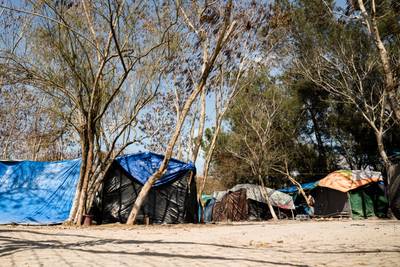Column: Observations and Suggestions for a Better Response to Chicago’s Migrant Crisis

![]()
Column: Observations and Suggestions for a Better Response to Chicago’s Migrant Crisis (Chicago, IL) — For several years, I have represented immigrants before USCIS and EOIR – two of the agencies tasked with vetting immigrants to the United States. These agencies routinely decide whether an immigrant has entered lawfully or not, whether the immigrant is entitled to any future or continued status, and whether an immigrant has acted in such a way as to make themselves inadmissible or removable under the Immigration and Nationality Act, or companion legislation passed after the INA was signed in to law.
It is no secret that Chicago has seen an influx of between 65,000 and 100,000 migrants, many who are prima facie eligible for asylum under the laws of this country. Still more are parolees – lawfully admitted by Customs and Border Patrol or Immigration and Customs Enforcement. In the well-intentioned race to meet the needs of the moment, public officials have allotted almost half a billion dollars subsidizing housing, medical care, food, and other basic humanitarian needs for the new arrivals. At the same time, we see images of migrants sleeping in slum-like squalor, with children dying of disease under the care of the outside companies hired at bloated contract prices to monitor the sanitation and cleanliness of these slum properties.
The Southland Journal has given me the privilege of writing several advocacy pieces in its paper on the topic of immigration. These articles will identify the obvious problems with our nation’s immigration laws and policies, as well as suggest common sense, cost-efficient policy positions our City, County and State may take to protect the rights of Illinois residents while meeting our humanitarian obligations to new arrivals fleeing instability, persecution, violence, torture or some bitter combination thereof.
Generally speaking, cities have no legal authority to deal directly with issues of migration. That right is reserved to the United States Congress in Article I of the United States Constitution. Perhaps you’ve read of SB 4 – the Texas state law that authorizes state officials to enforce immigration law. That law has been put on hold by the Courts – again – and likely will not survive to see itself enforced. This is because it tries to take away a power granted exclusively to the federal government.
Democrats in Washington – including the President – have implemented an “open borders” policy in the last three years – paroling in a significant chunk of otherwise inadmissible immigrants to the United States and turning a blind eye to the scores of other “unaccounted for” unlawful entries without inspection. The federal laws were not written with this intention in mind, and the consequence of this policy decision has come at a significant cost to African-Americans residing in liberal northern cities like Chicago, New York, Philadelphia and San Francisco. Public services and tax funds are re-allocated from African-American communities to pay for temporary migrant arrivals, some of whom may not be here more than a week. In essence this serves as a triple hit because inflation has devalued the dollar so significantly in the last four years.
Setting aside the question of how to allocate blame for missteps, fixing the crisis requires a commitment to a series of principled policy positions that fairly reflect our commitment to civil liberty and the rule of law. I offer this framework of policy principles for handling the migrant crisis in Chicago and other municipalities today.
- Tax revenues must be spent on the needs of life-long Illinois, Cook County, and Chicago residents before those funds are used to assist new arrivals;
- To the greatest extent possible work to preserve family units that constitute “mixed-status” family households.
- Sue to have the federal government take direct responsibility for the humanitarian needs of the migrants, including subsidizing / providing direct housing, medical care, food, and other basic humanitarian needs for the new arrivals out of the federal budget;
- Prohibit entry of travel vehicles carrying migrants on roadways, train depots, and airports in Illinois if that travel was not directly commissioned by the Department of Homeland Security or an affiliate agency;
- Reroute all new arrivals to Washington D.C. upon arrival;
- Prohibit the use of City, County, and State tax funds for any arrivals in Chicago entering after a certain date;
- To the fullest extent, cooperate with ICE to remove violent criminal offenders from City, County, and State jurisdictions, irrespective of sanctuary edicts, immediately;
- Terminate City, County, and State subsidies to migrants after 2024;
- Partner with private organizations to meet the remaining needs of new arrivals who have assimilated to life in Chicago and who have a federally cognizable right to remain in the U.S.;
- Use federal subsidies to pay residents / private local companies for services that meet the needs of new arrivals, rather than funding politically connected NGOs and out-of-state companies to deliver substandard results at inflated budgetary costs.
The work of fixing our immigration system will not happen overnight. But if our elected officials commit themselves to this framework – and surrounding themselves with competent subject matter experts – we can see rapid improvement on the worst consequences of the migrant crisis in a relatively short window of time, politically speaking. These policy principles will benefit life-long residents and new arrivals equally – addressing the shortcomings of our current responses that all members of the community are feeling.
Mr. Heiderscheidt is the owner and managing attorney of Subscription Lawyer, a law firm serving criminal, immigration, and civil clients in Chicago, Cook County, and throughout Illinois. You can learn more about him at their firm website, www.subscriptionlawyer.com.
Column: Observations and Suggestions for a Better Response to Chicago’s Migrant Crisis








Responses